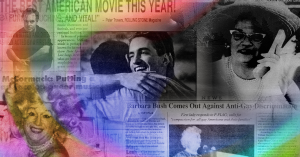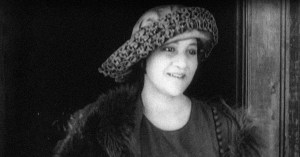The Girlfriend Experience‘s Amy Seimetz Plunges into the Intimacy Industry
The Indie-Filmmaker-Cum-High Budget Showrunner Discusses Call Girls, Her Leading Character's Potential Sociopathy, and Not Knowing What a "Good" Person Is

The representation of prostitution on television isn’t exactly rare. However, aside from shows like Secret Diary of a Call Girl (with Billie Piper), comedic turns like Patty the Daytime Hooker (Dale Dickey) in My Name is Earl, and the 1984 television movie My Mother’s Secret Life (with Loni Anderson and Amanda Wyss), prostitutes have usually been portrayed in a stereotypical manner.
The Girlfriend Experience, premiering this weekend on Starz, looks to remedy things by presenting a three dimensional look at the life of a high end call girl in Manhattan, adapted from Steven Soderberg’s 2009 drama.
Executive producer Soderbergh hired Amy Seimetz to co-write, co-direct, and serve as an executive producer on the series. While she might not be a household name just yet, Seimetz has been a Jane-of-all-trades for years. Her notable acting roles include The Off Hours, Family Tree, Upstream Color, and The Killing, but she’s a gifted, acclaimed indie filmmaker as well, having written and directed Sun Don’t Shine and various other projects. Seimetz fell into a shocking new world where budgets were large and she could freely create. Here, she tells us what that transition has been like for her, what the job offer phone call was like, and how real ladies of the “experience” live.
Kerr Lordygan for Rotten Tomatoes: You’re now a showrunner for an awesome, new Starz TV series. Did you feel you were ready for that? What challenges did you overcome, if any?
Amy Seimetz: Knowing now what I do, yes, I was definitely ready, but going into it, of course not! I’ve made movies for $100,000 or less for years and I acted, but not directed television. But in my first conversation with Soderbergh, I was like, “I don’t know how to direct television.” And he said, “Oh, you gotta learn somewhere.” What’s sort of amazing about it is he saw something that he thought was going to translate to the television format. Television is sort of the Wild West right now, so it’s not just me that’s getting chances like this; there are tons of other filmmakers that are getting chances because everyone is waking up that independent film translates really well to television. Not just in a cost efficient way, but viewers are craving original content.
Rotten Tomatoes: It’s difficult to stand out during Peak TV now.
Seimetz: Yeah, completely. But at the same time, you’ve got this group of — most of the people that I’ve “grown up with” in independent film are now delving into television, mostly because it’s such a beat-down to get your small movie out there. And here is sort of a format that you can make content that is personally yours, because we’re in that realm right now, but it has distribution built in. So it’s sort of a dream for independent filmmakers for this to be happening right now.

Rotten Tomatoes: You’re a director/actor/writer; is any one more rewarding than the others? Or do they all just feed into each other?
Seimetz: They all feed into each other. I started as a writer/director because when I was very young, I just wanted to be a writer/director. But because I was learning my craft and was maybe a little insecure about what I wanted actors to do, I would just act in my own stuff. So all of it sort of developed together, and now they all feel connected. I was just telling somebody that when I’m acting, it’s almost the greatest undercover job ever to go to somebody’s set and be like, “Oh, this is really interesting how they’re doing things [laughing].” For the most part, the things I’ve acted in have had larger budgets than I’ve had, so even doing that and getting exposed to how people are working at different budget brackets — it’s really interesting for me. Because I didn’t come from money and I had to use the resources around me, I just sort of adapted my filmmaking and my producing to the fact that I didn’t have any money. And now that I’m being exposed to budgets — actual budgets and things like that — it’s interesting that it’s still essentially the same thing. But you’re not going in debt, you’re not worried about paying your rent. You’re not worried about getting a wheelchair instead of a dolly [laughing]. But you’re still using the same sort of knowledge; it’s just that you get fancier tools, I guess.
Rotten Tomatoes: The Girlfriend Experience has a very dark premise with a very dark character, and audiences eat that up these days. Do you have any thoughts as to why we devour that darkness so much?
Seimetz: Personally I always lean towards darker [laughing]. I think we’re in a really dark period of time right now, to be honest. I think in any sort of post-war situation, you’ll find movements of our fascinations with trying to understand what the human condition is — sort of breaking apart what the norms used to be — where it’s like this form of art has led us to war, and that’s where Dadaism came from, that’s where Surrealism came from, that’s where impressionism came from. All these movements of art are breaking apart whatever form we feel we are identifying with, and now we want something new. And I feel like we are sort of ignoring — publicly or politically — some of these darker aspects of where we’ve ended up, like hyper capitalism — which pertains to our show — or I guess Breaking Bad. I think it’s just sort of trying to understand what our society is doing. I find it bleak. Maybe I’m a little doomsday about it, but that’s my theory, in a way.

Rotten Tomatoes: What do you think is the correlation between office politics — or even the legal industry — and something like prostitution? Are you trying to make that comparison? Does the show have a specific point of view?
Seimetz: As dark and sort of moody as the show is, we’re not trying to say that this is bad — that the world is bad. Or good. We’re just sort of showing it and trying to draw conclusions as to how we act as human beings. In general, whether it’s law or business or prostitution, I think most interactions are transactional — whether it’s money or what somebody can do for you or how they make you feel. You want something out of an exchange from a human being in general in your life, right? And I think any business or any sort of part of your life is also about creating boundaries and knowing when a relationship isn’t good or isn’t benefiting you anymore. Which I think, in the world of escorting, is sort of heightened, because there are these ready-made relationships that you step into and you’re immediately intimate. The expectation is to immediately become intimate with somebody. It’s this sort of heightened — or a much more dense — version of how we operate in society.

Rotten Tomatoes: What a job skill, having to turn on the intimacy in 0 to 60.
Seimetz: Yeah. I mean I’ve had friends who are sex workers, and we’ve interviewed lots of sex workers. I use a part of my personality that is similar to that to be an actor, a director, and writer. To enter a room with a stranger alone is not a leap. It’s not part of my personality [laughing]. It’s definitely not a job for every woman. To each his own, you know? But to me personally, it’s simultaneously terrifying and elusive and sexy. But ultimately the terrifying aspect wins, for me on a personal level [laughing].
Rotten Tomatoes: Very similar to acting, when you have to go into an audition and instantly emote.
Seimetz: Yeah, or even just working with people. When you’re on set, you’re using your emotional tools. So a lot of times you get into deep stuff and you share secrets with people on set that you don’t normally talk about in this very bubble-like atmosphere with people that maybe met two weeks ago. They’re trying to get something out of you and they’re asking you to pull — again because I lean much darker, but even in comedy too — trying to pull something out of you that is deep-rooted. You find yourself sharing a lot more on set in that atmosphere than you would over coffee with a stranger.

Rotten Tomatoes: Christine is referred to as a “female Ted Bundy.” She doesn’t seem to like people. Then it makes her question herself. Is she a good person, and what sort of character arcs can we expect from that personality type?
Seimetz: I don’t really know what a good person is. I come from a laundry list of extremely complicated human beings [laughing]. And so there have been moments where they’re not so great and there have been moments when they are wonderful. So I don’t know. I think what’s interesting is her feelings, in general. The conflicts that occur in the show are from the aspects of her personality where she is extremely unapologetic about how she feels. She has a flicker of a moment where she wonders if something is wrong with her — if she’s a sociopath. But that’s only because somebody said that to her. But really she’s like, “You know what? I really don’t care.” And she just keeps going. Most of the conflicts come out of that unapologetic nature of the female character, because in our society — and in television — we don’t see a lot of women who are unapologetic, or are sort of OK with how they are in life, and whether or not that meets everyone’s norm. She’s not struggling to understand herself — she already knows herself. She’s just discovering her superpower, in a way [laughing].

Rotten Tomatoes: When do we see the real Christine? Is it when she’s working, or out socially, or alone?
Seimetz: I think that’s up to the viewer to decide. Part of the allure of what we wanted to do from the series is for the viewer to constantly question who the real person is. Whether Christine is herself when she is doing her law stuff or if she is herself when she is with her clients, I don’t think any one personality is that simple. I like to say that I am myself no matter what, but I don’t treat the clerk at the grocery store like I do my mother. I feel like we’re all playing roles every time we make a transaction or every time we are in social settings. Not that we’re all completely changing our point of view, but we are all sort of playing a certain part that participates in whatever is convenient to the situation.
Rotten Tomatoes: You mentioned earlier that you interviewed people in the industry. What other research did you do to put this together?
Seimetz: When [Steven] Soderbergh first called me – he really did call me on my telephone and just offered me a television show. That really happened [laughing]. It was crazy, just weird. I think I was at Whole Foods or something in Vancouver, and I didn’t have good reception, so I had to step out into the parking lot and answer his call. That makes me sound so bougie: “I was at Whole Foods…” I’ve had a weird life. When I was on the phone with him I said, “What do we do next?” because I didn’t know what to do. He said, “Oh, we’re going to fly to Northern California and we’re going to interview some high end escorts — or GFEs [industry acronym for girlfriend experience].” I said, “OK!” So [Philip] Fleishman — one of the other executive producers, I think — I’ve asked him — I think he just cold emailed then on the internet [laughing] and found some women to come in and do this interview. I think there was a lot of, you know, “No, it’s legit” on his part. Anyhow, he found someone then, and then there was a woman that Steven used that was his consultant on the movie as well that we interviewed. And they’re all very different. The thing that I find most interesting is that they are all very unapologetic about what they do. They don’t feel bad about it. Also even on the topic of whether it’s right or wrong, they just kind of shrug and say, “This is what I do. You can believe whatever you want to believe, but this is what I do and it’s fine for me.” Which I find really, really awesome.

I’m not a religious person and I’m not a judgmental person, and if women are willingly doing this and they really want to be doing this and they’re really fine with it, then I don’t think it’s anyone’s place to “save them.” Obviously there’s a whole underbelly that is not the world that we are exploring. Any sort of industry has its own underbelly of abuse and slavery, right? That’s sort of my take on the whole thing: you take any industry and there’s going to be abuse of power and abuse of human beings and different variations of it. Whether it’s people participating in a willing act and they’re adults, obviously, that’s completely different.
Even that story that apparently James Franco just bought the rights to, the woman [Zola] that took the trip to Florida. It’s actually really fascinating. This woman was a stripper in Detroit and she went with this other woman who was a stripper. They went on this road trip to Florida and she quickly found out that she was pressured/manipulated into becoming a prostitute. This guy was putting out ads on her and whatever. But what I found is, it is extremely entertaining but, at the same time, when I found myself reading it, this is so upsetting and it seems much more common of how women end up becoming forced into this situation. All of this stuff happens — people get kidnapped, people get this [and that] — but I think in America when we talk about people being forced into the industry, I think it’s much more manipulative. It’s people that you know and trust and are preying on sort of an emotional weakness that [the victims] have. I find that really fascinating as well, which is a completely different world.

I think that’s also why I find our lead character — or women who want to be doing this — so interesting. They are breaking so many social codes that we expect from this line of profession — that they are willingly entering into a situation of objectification or whatever you want to call it. But they like it and they want to be doing it. Do they love their clients? Do they like their clients? I don’t know how to answer that — it’s not for me to answer that — but I think that’s why it’s so fascinating and why I think it’s so alluring — stepping into this situation that seems so dangerous and nasty. But a lot of these women have clients for, like, ten years and more, in specific instances. I’m not saying that’s the norm. It’s just this specific world that you enter willingly and you enter in the sort of higher-end world where they are looking for somebody who is intelligent and college-educated. This is an echelon of prostitution that isn’t across the board. It’s a specific world. And they want women who are intelligent and obviously beautiful. But for the most part, the women that we interviewed were very beautiful, but they just seemed normal. I think that was the appeal. They didn’t seem like what you would expect. You wouldn’t be able to point them out in a room and say, “That’s a prostitute.” Put it that way.

The Girlfriend Experience premieres Sunday on Starz at 8 p.m.






